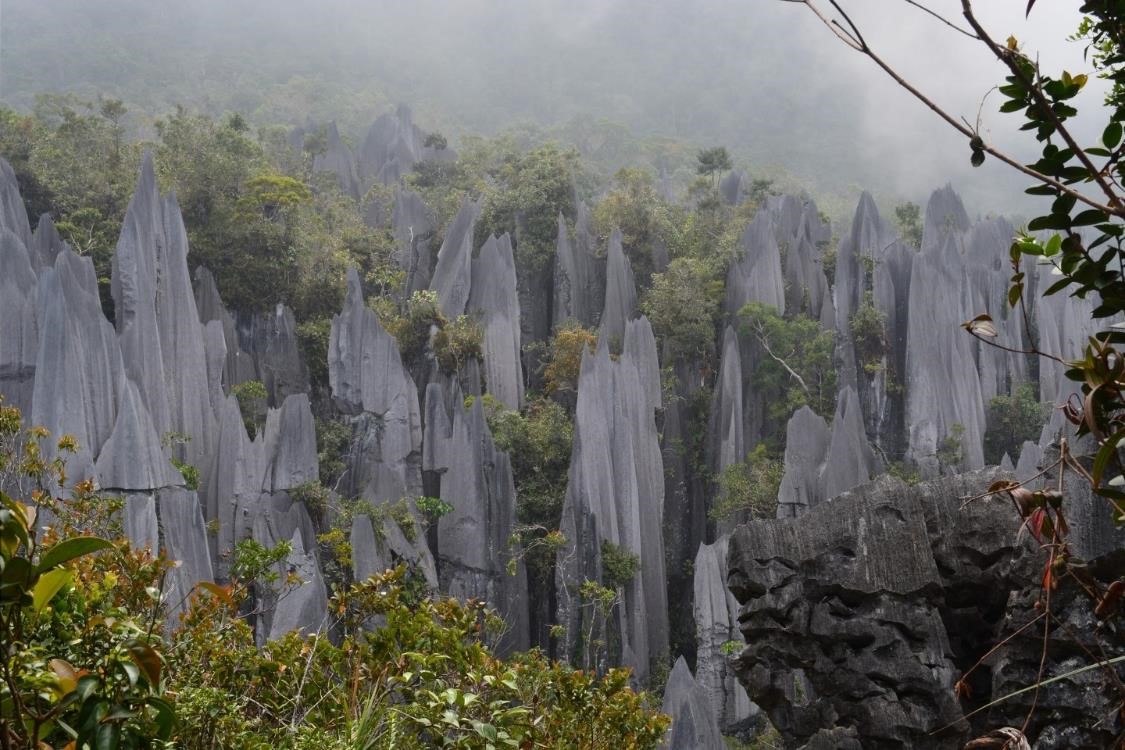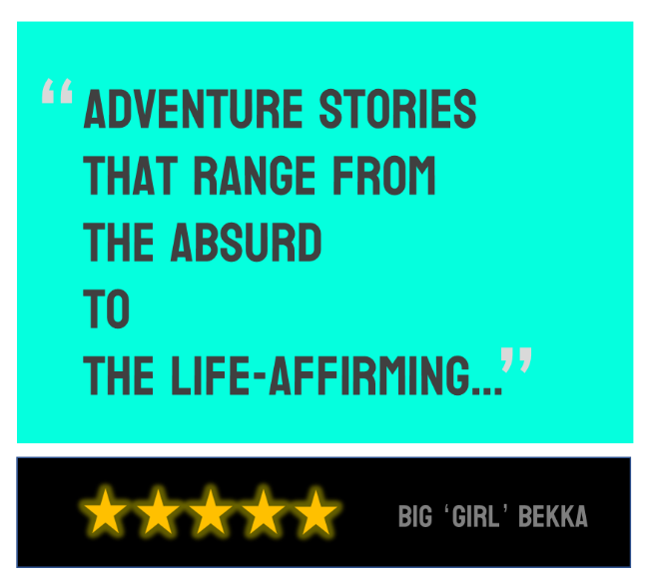Death and the Jungles of Borneo
Travel with Pal Blanko as he explores the Caves of Mulu and climbs Gunung Api Mountain to find: The Pinnacles of Borneo, and Death. {Jungle. Borneo. Mulu. Death}
Melinau River, Borneo 2015
There are no roads here.
Actually, that’s not entirely true. There are in-fact two roads; one leads to the river and is a hundred yards long. It’s a beautiful thing; straight, largely flat, and possessing of almost enough width for two cars, but not quite. At a T-junction, the second road helps to form an illusory choice, between prospect of turning left; which after half-a-mile leads you to a dead end, and turning right; which after half-a-mile, leads to a dead end.
So, there are roads, but not necessarily as you’d know them…
As a consequence of this asphaltic enigma, there are no cars and only two ways to get here: light aircraft or heavy canoe. However, when the river drops during the dry season, the option list is reduced to just the plane, and see, when the plane isn’t running …well, you sit back and admire the view.
And what a view it is… On approach, our twin-prop aircraft banked sharply and dropped down through the cloud, and we got our first glimpse of the jungle. It appeared so green and so verdant as to defy description. This might sound fanciful, until you consider the sheer numbers involved; but in whole of Europe there are just seventy-five species of tree, and through the small aeroplane window I could see over a thousand - and that’s just the trees. This was proper primary rainforest: the real deal.
Everything writhed and clambered over everything else around it; in order to obtain an extra glimpse of sunlight, or another drop of rain. From above, one could see the upper-canopy hardwoods struggling to get their heads above the botanical bar-fight beneath, and to retain some sort of dignity. For those of you with the patience for Botany, or for those simply wishing to improve their scrabble – they are, I'm informed: “Mixed Dipteropcarps”
"The way the jungle grows round here is just staggering. You can almost see it seething in front of you, like a B-Movie monstrosity; determinedly devouring everything in front of it..."
As we dipped below 5,000ft, a small black strip of tarmac appeared from under the canopy - an endeavour no-doubt built by some sort of optimist. The way the jungle grows round here is staggering. You can almost see it seething in front of you, like some B-movie monstrosity, determinedly consuming everything before it.
From up-above, the rivers now came into view, and the plane dropped violently into an invisible pocket of turbulence. Kapps was ominously silent and dug her talons deeper into my forearm. Seeking relief from the impromptu acupuncture, I noted: "Hey, look down there… That’s the air-strip..” To which the horrified response came: “...That’s the air-strip !?”
She had a point. Although I decided not to acknowledge it, opting instead to pull a leather fedora over my eyes and catch some zeds. We’d now been travelling for 22 hours non-stop, and sleep came upon me relatively quickly. After a while, we landed, but our bags didn’t.
Being an understanding type of guy, I agreed to the notion of ‘speaking to someone’ about this. Kapps looked at the sole check-in attendant, sat at the solitary check-in desk in the deserted hangar, with a sense of expectant hope. Perhaps she thought that somewhere in the thirty-seven feet between plane (which had now left) and the baggage carousel (which didn’t exist) our bags would appear. The attendant looked at Kapps and then back at me, without saying a word. Sensing the attendant’s predicament, I offered:
“So, when’s the next plane?” Immediately her face brightened, as this was her opportunity to give us the good news, and to avoid that most painful of Oriental fates – a loss of face.
“Oh, they run very regularly Sir. Every day, when the weather is good…” she beamed.
“Oh good…” I replied “…How’s the weather looking tomorrow?”
“Very good sir… [ pause ] …currently”.
I pressed my palms together in thanks, and offered her “Terri Makasay”. She beamed again.
“Samah Samah” came the cheery reply
Welcome to the Jungle. Welcome to the banks of the Melinau River. Welcome to the dark seclusion of Gunang Mulu, and the Island of Borneo.
***************
Presently, I'm laying on my belly, scrawling notes into my jotter by the light of a failing head-torch. M’Kapps is by my side, in a gentle slumber and we are cocooned in a king-sized mosquito net. My bird of the tropics has us tucked-in quite splendidly, and any insect without access to either a pick-axe, or substantial lifting gear, will be in for a bloodless night.
We’re at ‘Camp-Five’ a semi-permanent exploratory camp which academics, geologists, cave explorers, and general bat-shit specialists use as their launch-point, before heading-out deeper into the jungle and the unexplored caves beyond.
It’s worth noting that the caves of Mulu were only ‘discovered’ by the white man in the late 1970s, and even though we don’t yet know how big they are, we already know that they are the biggest in the world. For instance, the 'Clearwater Cave' on its own, stretches the distance from London to Liverpool, and that’s just the stuff that we know about. When the cavers submerge themselves these days, they’re gone for weeks at a time, and their expeditions run like assaults on Everest. Small parties of locals drop-off supplies at noted way-points along pre-bolted ropes that, with every passing year, stretch ever-deeper into the belly of the beast.
I saw some of these cavers heading-up river the day before us. They looked seriously tough and their kit even more so. When you’ve had good-fortune enough to have travelled a little, one becomes aware of that curious psychological ‘balance’ that exists between porter and port-ed. Most often, the porters look relaxed and even bored by another load of tourists, who they’ll take up the same well-worn track, that they've visited countless times before - But every now and then, one is lucky enough to be in a place like this; where the dynamic is reversed, and where the look on the porters' faces is something akin to: ‘I’ll take your money mate, if you think you can do it …but me, I’m staying by the entrance!’
It was fascinating, just sitting quietly on the river bank, watching them load the canoes. One of the Cavers had waved them off, his arm in a sling. He wasn’t going with them this time. A few weeks back, he’d taken a fall off a cliff, underground, and the rest of the party had been forced to make a perilous abseil downwards, to find him amidst the darkness. After locating him, they'd had to tie him to makeshift stretcher, and drag him back up the cliff face, as best they could. They then man-hauled him out of the cave and up a near-by mountain in order to get satellite-phone coverage, and in order to contact some porters who could take him back to camp. He’d been just 10km (6 miles) away from base-camp when he took the fall, and it’d taken them five days to get him back.
Proper. Primary. Rainforest.
We hadn’t come to Camp-Five to cave. Instead, we’d hiked-up the Head-Hunter’s Trail to mount a upward assault on The Pinnacles, a world-famous, and torturously-splintered, spine of rock that emerges from out of the cloud forest at the top of Gunang Api. I’d seen a photo of The Pinnacles in a tattered magazine a couple of years back, and had persuaded the Kapps of their merits.
It’s now midnight as I scratch my notes, and three hours since we arrived back. Every one of our six-man party is asleep. I am shattered, utterly shattered. On this mountain, I’ve come damned-close to finding my limit. Five hours of upward slog over and under a myriad of tangled trees, roots, and creepers, in 30 degrees of heat, and in 90% humidity. The perspiration just runs off you, as if you’re stood under a shower - and if that weren’t enough, your climb is accompanied by clouds of inch-long Salt Bees, who swarm all over you; for just the smallest drink of your hot sweat. They seem to take particular interest in you whilst you're attempting a one-handed traverse along a ledge, overlooking a sheer precipice - perhaps it’s because you’ve slowed-down enough for them to catch-up and crawl all over you, or perhaps it’s because they’re total sadists. It remains unclear.
Eventually we summited, and were greeted by a bizarre other-worldly landscape; vicious knife-like rocks, surrounded by the swirling mists of the Cloud Forest. Some of the shards were 100ft high and others were much taller still. About their bases, where not even the jungle could penetrate, dark and seemingly bottomless crevasses lurked into which you dare not look, and about which none of our party ever dared ask.

One of our companions (a nice guy, who was on-leave from the British Army base in Brunei) asked our tribesman guide:
"How do you medivac someone off the summit, if they get injured?" This solicited the following Pigeon-English:
“No helicopter. Too dangerous. It not Hollywood movie…”
“No helicopter.
Too dangerous.
It not Hollywood movie…”
After some further questioning, it was understood that the only way off this mountain. if injured. was to either [a] get yourself down (possibly not such a good plan, if you’ve snapped your leg in seven places and your middle name isn’t Joe Simpson) or [b] hire some local porters to strap you to a makeshift stretcher and drag you over each jagged rock one-by-one, during a period of several agonizing hours.
That said, if darkness fell during your decent, then you’d at least get some respite - because at sunset, the porters would just abandon you, go home, and come back for you the next day. Foolishly, I then enquired why this was, to which our guide replied:
‘When dark, it too dangerous for local people”. Clearly the locals had developed a calculus as to the risk/reward profile of nocturnal climbing.
There was no talking from our party for the next five minutes as we began our decent. It’s was 1pm and everyone was thinking the same thing: ‘Don’t get injured’ and ‘Be down by sunset’.
On the way up, Kapps had a found the going near impossible and I’d just thought it a good work out. On the way down, our roles were now reversed, and I swore under my breath for the lack of forethought at not having brought a stick. With one semi-paralysed foot, it’s tricky to trust your balance, and when the prospect of getting it wrong is a head-long swan-dive off a 1000ft ledge, one tends to err on the side of caution.
I was slow, and I knew I was being slow, and I didn’t like it one bit.
“We keep moving!” urged our guide ‘Joe’. Like the other Penan, he was a short man with the most ferocious set of gnashers you’ve ever seen. Quite how he'd managed to cram so many teeth into his mouth was a mystery to me - but then again, round-here they don’t have TV …so they must have a lot of free-time in the evening.
“No slow down... Dark come soon…” Joe reminded us. It was now 2pm and still the temperature was over 30°C.
Like some sci-fi crossbreed between a mountain goat and Dame Margot Fonteyn, Kapps picked her way nimbly from rock-top to rock-top. She made light work of the decent, quickly taking the lead, until we all shouted:
“Kaaaaaaaaaaaps! ...STOP !”
“Why?” she called up, quizzically.
“Just stop!”...cried Joe. She now stopped absolutely still on the ledge beneath us. To her left and entirely out of her eye-line, something big was moving through the vegetation, at pace. It then stopped, just 10ft from her.
“What’s the matter?” she called-up from the ledge
“Just wait…” counselled Joe. I looked-up and asked him what the hec it was? …We’d seen the movement, but not the beast itself. “Wild Boar” he whispered. With my free hand, I reached for a throwing rock, and with my face I pulled the expression: ‘...a pig?! …up here?! ’
Small branches were being snapped below and the perpetrator, still unseen, had now sensed Kapps. We waited a while. I gripped the rock even more firmly, looking down at the source of the disturbance. My thoughts were clear: ‘That’s my Kapps. You are a pig. This is a rock. And I won't miss.’ ...Thankfully my throwing-arm was not needed, and as suddenly as it’d arrived, our visitor shot off – back from whence it came.
Kapps was as bemused as any of us, when we got down to her, and told her of the boar - but a glance down at our watches had the effect of cutting-short ‘story-time’, and we all moved-on. Still I was slow, and still it was hot. I apologised for holding everyone back, but our Army companion, his wife, and the Filipina ultra-runner behind them, all told me that it was OK. Still, I felt ashamed.
It was endless and the hours ticked on by: 3pm, then 4pm, then 5pm and then darkness. And then I ran out of electrolytes. Still we were 700ft up a mountain, and I found myself mulling the choices: too much water and I’d likely bring-on another bout of encephalitis and probably die, and too little and I’d get heat-stoke and possibly die. There are few occasions in life where ‘possibly die’ seems like the better option, but this was one of them.
This was my first big yomp since recovering from my coma, and I'd chosen to do it, in a jungle, in the dark, sweltering with heat, and at the extremity of civilization. Idiot.
Our tiny Filipina friend offered me a couple gel sachets.
“Go on, take them..” she said “…I brought a bunch. When I go over the first fifty-miles, I just live-off them. I know how you feel.” I thanked her with utmost gratitude, and asked her how this climb compared to one of her hundred-mile road-races, in the heat of the Philippines? Her judgement was swift:
“This…” she said “…This is way harder”
I was flattered and concerned in equal measure. This wasn’t just bad because I’d been caught-out, it was bad because we’d all independently been caught-out. And yet, all of us had spoken to the staff at base camp near the air-strip, and all of the folks there had assured us that The Pinacles ‘was no big deal’.
( Note: Upon returning to the base-camp later in the week, we found that not one of the staff there had actually done the climb. ‘Too dangerous’ they said. ‘Very exhausting’ added another ).
Meanwhile, we were still on the mountain, and it was now exceedingly dark. Every wee night-bestie was now awake and either crawling over you, or buzzing in your face. Being naturally good of night-vision, I opted to turn-off my head lamp. Using a head-torch, with the air this full of beasties is not advisable, unless you’re hungry for something crunchy.
Frustrated with my own slow progress, I quickened my pace and started to use my upper-body to swing-off and against the trees. I wanted to get off of this mountain, and the sooner the better. My increased pace gave those behind me the chance to speed-up, but not long-after came a shrill cry. Looking back, I could see the Army Guy’s wife, lying in a heap at the bottom of a wet rock-face. She was sobbing and clutching at her ankle, that was twisted back, and hanging at a peculiar angle. In no time, Kapps was up and onto the situation, like a terrier at a rabbit’s neck.
“It’s probably broken” was the prognosis that none of us wanted to hear. “You’re going to have to stay-off it for the rest of the way down” Kapps advised. I looked at the Filpina, and the Filipina looked at me. Our eyes locked, and both of us said nothing. Gamely our Army friend began to coax his wife down the mountain, rock by rock. She was brave. I’ll give her that.
No long after, it was my turn to yelp; as somewhere in the darkness I’d managed to put my finger straight-through a needle thorn. I turned-on my head torch, and brought my hand out, from under the branch onto which I’d been hanging, only to see a ruddy great bullet-ant (over an inch long) with its venomous pincers dug into my knuckle. Like a wasp-sting to-the-bone, those buggers take your breath away. Reflexively, I punched the tree. It did nothing for the bite, but a great deal for retribution.
Another three hours of hell followed, then the terrain began to soften. The gradient wasn’t so steep now, but I was getting dangerously hot, and was refusing water in the quantities that Kapps was offering. This is the joy of hyponatraemic encephalitis: it's like a hand-grenade that goes-off inside your head, and there's no telling what will pull-the-pin. Having survived the shrapnel of my first encounter, with only [quote] 'minor brain damage', I wasn't keen on riding my luck, so I figured overheating was the lesser of the two evils. Better to push yourself this way, in preference to the other.
After another hour, my judgement was still good, but I could feel that my skin was red-hot to the touch. I listened to my own heart-beat thumping in my ears: fast and regular, and crucially without any hint of jazz. Keep going. We’ve got the measure of this one, Blanko.
Sweaty, bedraggled, and at some-time after 9pm, we made into camp. I made for the makeshift canteen, and grabbed a large spoon of salt and one of sugar to add to my flask. Slowly I sipped on it. I was scarlet red, and from the looks of the faces of the guys sat watching, none too pretty. Kapps and Joe looked after the injured army wife, and with their permission, I took myself off to the camp showers, where I stood, bit-by-bit, under a cold tap; until I’d dropped my temperature. The cold water burned like it was boiling, but I didn’t care. I knew the routine. Sip on the electrolytes to rectify your fluids, and use the shower to lower your temperature.
I must have been there for half an hour. When I emerged the assorted Geologists and Bat-fiddlers all looked suitably concerned, but I knew I was OK. Feeling sorry for me, one of the canteen porters brought me an Orangina that he'd cooled in the river
“Take it. You need it…” he said. I looked-up, pressed my palms together, and thanked him in Penan
“Jee-Ann Kanin” I stammered
“K’wah K’wah” came his beaming response. Together we sat on the river bank.
“That was tough…” I confessed; I the parishioner, he the priest.
“Yes…“ he nodded “…Many people, they die”
“Eh?” said my mouth, my brain still slow.
“...What? ...recently?” interjected Kapps, who’d now caught-up with me again
“No… not recently… Maybe one month ago” at which point neither of us saw-fit to interject, so he just continued “...Yes. Young man. He died. He fell. Many sharp rocks on mountain. Broke bone in arm. No cut on skin. But bone inside arm it broke. It damage his body, and he bleed inside his body, and he die. Very sad.”
“Were you here when it happened?” I asked, as if somehow that made a difference.
“Yes, I here when it happen. Some they die on mountain. Some they die in the caves. Very sad when it happen.” Still both Kapps and I were silent.
“The young man, maybe twenty or twenty-five. He die here. He was with six or seven friend. It was summer, and river low, so no canoe. So they and porters, they all must carry the body on head-hunter trail through jungle. Maybe it take a day in the heat. Very hot. Then they put body on canoe to take it down the river. Very sad”.
There was no break in our silence, and upon a call from one of his tribesmen, he left us both, sat in the darkness of the riverbank
Kapps said nothing.
I took a sip on my Orangina, put my hand on her knee, and looked-out over the river, which I could not see...
Copyright Pal Blanko. 2022. All Rights Reserved
Travel with Pal Blanko as he explores the Caves of Mulu and climbs Gunung Api Mountain to find: The Pinnacles of Borneo, and Death.

Want more of the good stuff ?
Sign-up for the Pal blanko Newsletter below...
Travel with Pal Blanko as he explores the Caves of Mulu and climbs Gunung Api Mountain to find: The Pinnacles of Borneo, and Death. { Jungles Borneo Mulu Death}

